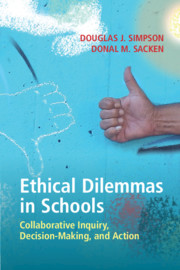Book contents
- Ethical Dilemmas in Schools
- Ethical Dilemmas in Schools
- Copyright page
- Contents
- Figures
- Foreword
- Preface
- Acknowledgments
- Chapter 1 What Can Educators Expect from Ethics?
- Chapter 2 What Does Sympathy or Empathy Have to Do with Ethics?
- Chapter 3 How Are Ethical Principles Useful?
- Chapter 4 What Does Regard for People Imply?
- Chapter 5 What Is a Problematic Ethical Situation?
- Chapter 6 What Are the Qualities of an Ethical Educator?
- Chapter 7 What Are the Characteristics of a Good School?
- Epilogue
- Appendix An Interview with Maria
- References
- Index
- References
Chapter 1 - What Can Educators Expect from Ethics?
Published online by Cambridge University Press: 18 December 2020
- Ethical Dilemmas in Schools
- Ethical Dilemmas in Schools
- Copyright page
- Contents
- Figures
- Foreword
- Preface
- Acknowledgments
- Chapter 1 What Can Educators Expect from Ethics?
- Chapter 2 What Does Sympathy or Empathy Have to Do with Ethics?
- Chapter 3 How Are Ethical Principles Useful?
- Chapter 4 What Does Regard for People Imply?
- Chapter 5 What Is a Problematic Ethical Situation?
- Chapter 6 What Are the Qualities of an Ethical Educator?
- Chapter 7 What Are the Characteristics of a Good School?
- Epilogue
- Appendix An Interview with Maria
- References
- Index
- References
Summary
Many future and current educators – teachers, leaders, counselors, and allied professionals – probably have more than a single expectation of the contributions of ethics to their educational theory and practice.2 Unsurprisingly, they have insights and cautions to offer about the field, especially in diverse schools and societies (Hansen 1988). The cautions are offered, in part, because opinions and expectations are so numerous and diverse that they frequently collide. Moreover, ethical claims and concerns can sometimes be off-putting because they are confusing now and again as certain ethical ideas are encountered (e.g., subjectivism, relativism, emotivism, pluralism, particularism). These strands of thought, however, are readily distinguishable (Pappas 2008; Ruitenberg 2007). Beyond wanting clarity and offering caution, then, many educators think that a study of ethics should offer ways of determining the differences between right and wrong and wise and unwise choices and actions as they interact with students, colleagues, and others. In short, they think ethics ought to offer clear paths to a fair, responsible, and caring way to teach and lead.
Information
- Type
- Chapter
- Information
- Ethical Dilemmas in SchoolsCollaborative Inquiry, Decision-Making, and Action, pp. 1 - 25Publisher: Cambridge University PressPrint publication year: 2020
